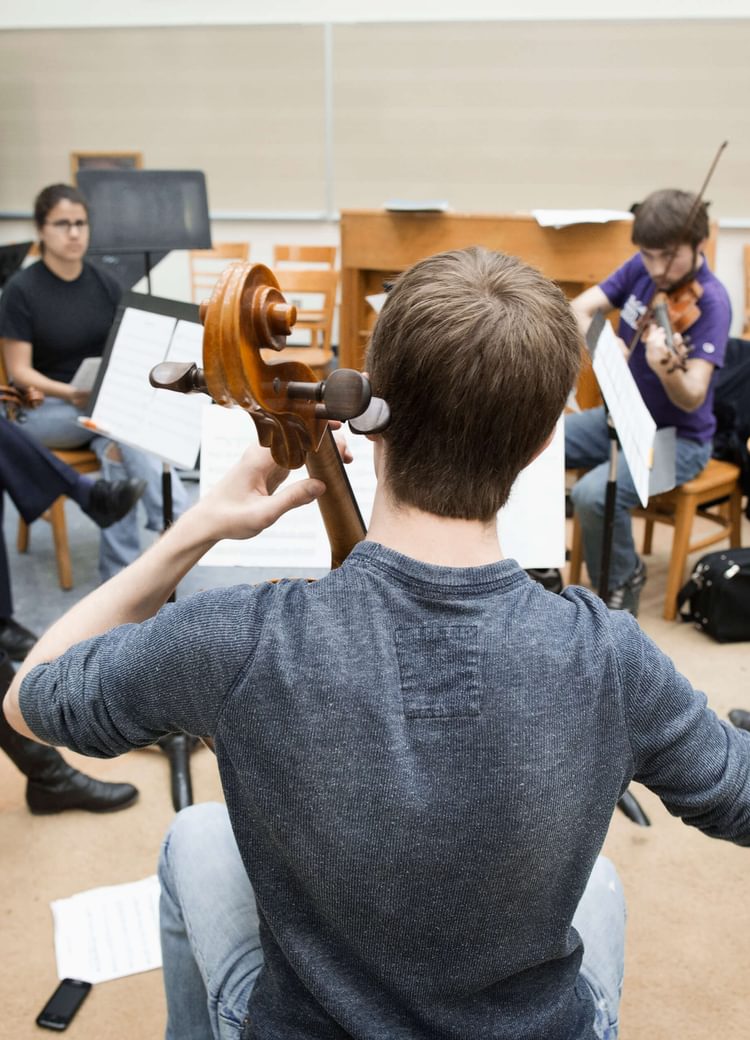
Why Choose a Music Degree at ËżąĎĘÓƵ?
The Bachelor of Music (BM) or The Bachelor of Arts (BA) at ËżąĎĘÓƵ is designed for students who are passionate about music and committed to developing their talents for professional performance, education, ministry, or advanced study. This intensive program combines artistic training with academic excellence to prepare musicians for meaningful and impactful careers.
Students receive personalized instruction from experienced faculty and participate in a wide range of performance opportunities—including ensembles, recitals, and collaborative projects. The curriculum includes music theory, ear training, music history, and applied lessons, as well as opportunities to specialize in areas such as vocal or instrumental performance, church music, or music education.
Whether your goals include performing on stage, leading worship, teaching the next generation, or continuing to graduate study, Bethel’s music program provides the foundation, mentorship, and experience you need to grow as a musician and a leader.
What You’ll Learn
The Music program at ËżąĎĘÓƵ offers students a strong foundation in the art and science of music through focused study in performance, education, theory, and music history. Whether pursuing a career as a professional performer, music educator, or church musician, students receive individualized instruction and ensemble experience that nurtures both their technical excellence and artistic expression. The program blends classical training with opportunities for creative development, preparing students for graduate study or careers in the music industry, education, and ministry.
As a Music major at ËżąĎĘÓƵ, you will:
Build a solid foundation in music theory, aural skills, and music history, learning how to analyze, compose, and contextualize music across styles and eras.
Receive individualized instruction in your primary instrument or voice, with regular performance assessments and juried reviews.
Participate in a variety of ensembles—vocal, instrumental, and contemporary—that develop collaborative musicianship and stage presence.
Gain pedagogical training and classroom experience (Music Education track) in preparation for K–12 music teacher licensure.
Learn conducting and rehearsal techniques for vocal and instrumental ensembles.
Study music technology and digital tools for composing, recording, and teaching music in modern settings.
Showcase your development through a senior recital or capstone project that highlights your artistic and academic growth.
Career Possibilities
Musician or Singer
Musicians and singers perform live or in studio settings, interpreting music across genres from classical to contemporary. They may work as solo artists, ensemble members, or session musicians, often managing their own promotion and bookings.
Typical Education: No formal credential required (B.M. preferred for classical/opera)
Median Salary: $42.45/hour (May 2024)
Job Outlook: 2% growth (slower than average) through 2033
Music Director or Composer
Music directors lead ensembles such as orchestras, choirs, or bands, while composers create original music for concerts, films, games, or advertising. These roles require deep musical knowledge and often involve collaboration with performers and producers.
Typical Education: Bachelor’s degree
Median Salary: $63,670/year (May 2024)
Job Outlook: 3% growth (as fast as average) through 2033
Postsecondary Music Teacher
Postsecondary music teachers instruct students in performance, theory, composition, and music history at colleges or conservatories. They may also conduct ensembles and contribute to academic research or creative work.
Typical Education: Master’s or doctoral degree
Median Salary: $83,920/year (May 2024)
Job Outlook: 4% growth (as fast as average) through 2033
Sound Engineering Technician
Sound engineering technicians operate and maintain audio equipment for live performances, recordings, and broadcasts. They work in studios, theaters, and event venues, ensuring high-quality sound production.
Typical Education: Postsecondary certificate or associate degree
Median Salary: $63,420/year (May 2024)
Job Outlook: 6% growth (faster than average) through 2033
Meet the Faculty and Staff
Please feel free to reach out to any of our faculty or staff with questions. We're here to help.
See All Faculty and StaffLydia Schoonover
Instructor of Music
731-352-4205schoonoverl@bethelu.eduJesse Dunaway
Assistant Professor of Music
731-352-4057dunawayj@bethelu,eduChrista Frye
Division of Music & Religion Chair ~ Assistant Professor of Music
731-352-6416fryec@bethelu.edu
Related Degrees and Programs
If you’re interested in this degree or program, here are others you might find intriguing.
See All

